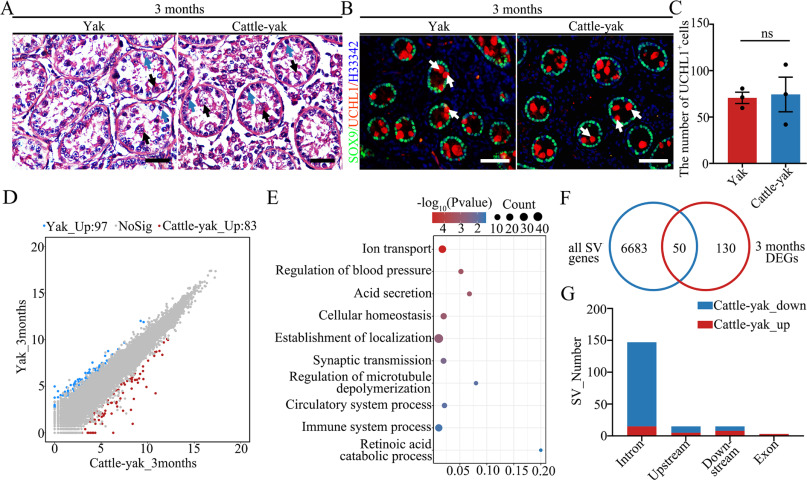Hybrids between closely related but genetically incompatible species are often inviable or sterile. Cattle-yak, an interspecific hybrid of yak and cattle, exhibits male-specific sterility, which limits the fixation of its desired traits and prevents genetic improvement in yak through crossbreeding. Transcriptome profiles of testicular tissues have been generated in cattle, yak, and cattle-yak; however, the genetic variations underlying differential gene expression associated with hybrid sterility have yet to be elucidated. We detected differences in the cellular composition and gene expression of testes from yak and cattle-yak at 3 mo of age, 10 mo of age and adulthood. Histological analysis revealed that the most advanced germ cells were gonocytes (prospermatogonia) at 3 mo and spermatocytes at 10 mo. Complete spermatogenesis occurred in the seminiferous tubules of adult yak, whereas only spermatogonia and a limited number of spermatocytes were detected in the testis of adult cattle-yak. Transcriptome analysis revealed 180, 6310, and 6112 differentially expressed genes (DEGs) in yak and cattle-yak at each stage, respectively. Next, we examined the spermatogenic cell types in the backcross generation (BC1) and detected the appearance of round spermatids, indicating the partial recovery of spermatogenesis in these animals. Compared with those in cattle-yak, 272 DEGs were identified in the testes of BC1 animals. Notably, we discovered that the expression of X chromosome-linked (X-linked) genes was upregulated in the testis of cattle-yak compared with yak, suggesting a possible abnormality in the process of meiotic sex chromosome inactivation (MSCI) in hybrid animals. We next screened DEGs harboring structural variations (SVs) and identified a list of SV genes associated with spermatogonial development, meiotic recombination, and double-strand break (DSB) repair. Furthermore, we found that the SV genes ESCO2 (establishment of sister chromatid cohesion N-acetyltransferase 2) and BRDT (bromodomain testis associated) may be involved in meiotic arrest of cattle-yak spermatocytes. Overall, our research provides a valuable database for identifying structural variant loci that contribute to hybrid sterility.

The link below will guide you to the reading:
https://www.journalofdairyscience.org/article/S0022-0302(24)01212-8/fulltext
